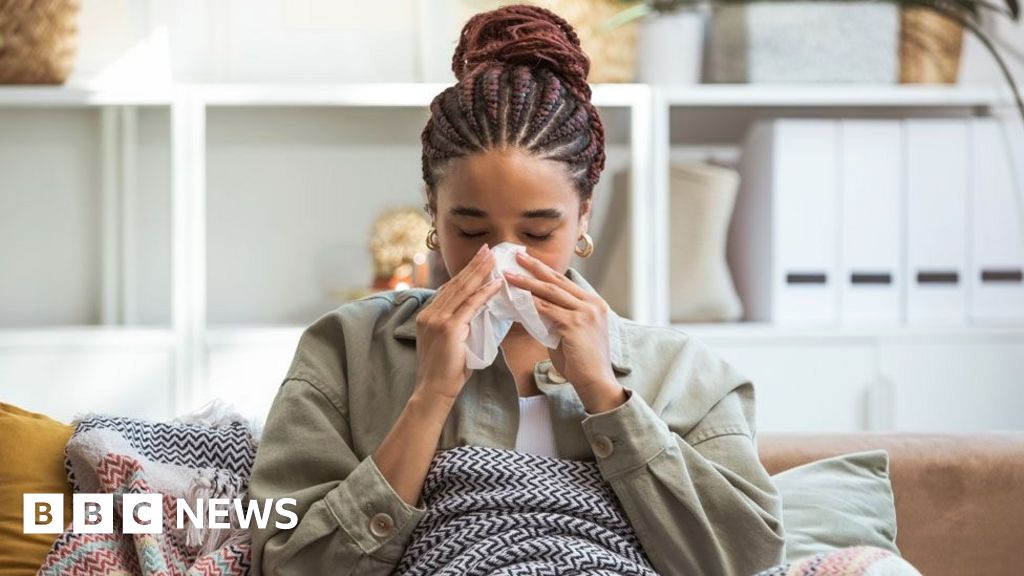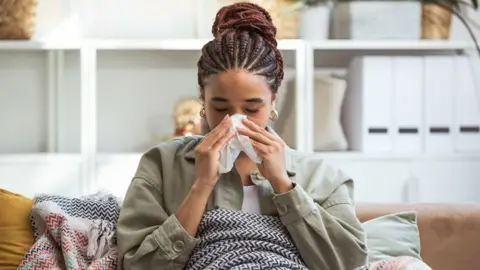Why you is likely to be feeling in poor health on a regular basis

 Getty Pictures
Getty PicturesHow are you feeling?
There was a vibe in BBC HQ that buddies, colleagues and household have been having a grottier yr than common – shaking off one chilly solely to quickly catch one other, rolling from an infection to an infection.
“The reality is we’re lacking data and so we have got a lot of anecdote,” says Prof Jonathan Ball, from Liverpool Faculty of Tropical Medication.
So what might be occurring?
It is a Covid summer time
We’re in a summer time wave of Covid so when you have a cough or fever then the virus is a potential wrongdoer.
We don’t acquire the identical detailed knowledge as through the peak of the pandemic, however the wave began to construct round Might.
“I know so many people who have recently had Covid,” says Prof Peter Openshaw, from Imperial School London.
Round 3,000 individuals in hospital at the moment are testing optimistic for Covid – round twice the determine for early April. The an infection is not essentially the explanation they’ve been admitted, however it’s a method of gauging whether or not we’re in a wave.
“There is a very significant rise, Covid hasn’t yet turned into a winter virus we can be very confident in saying that,” says Prof Openshaw.
This seems to be driven by the FLiRT variants of the virus and pubs rammed with football fans may have given the virus a helping hand too.
The virus is still capable of causing an unpleasant infection and while we are no longer taking emergency measures to keep it in check, we are giving two doses of vaccine a year to the most vulnerable because of the threat it can pose.
Disrupted seasons
You would expect to get most respiratory infections – coughs, colds and flu – during the winter months.
The cooler weather, spending more time indoors and keeping the windows shut all give those respiratory viruses an edge at that time of year.
One argument is the pandemic restrictions have knocked that usual pattern (flu almost disappeared during some winter lockdowns) and things haven’t quite returned to normal.
“It seemed to throw seasonality, particularly cold viruses, out of kilter so they were cropping up at weird times and I don’t think things have settled down at the minute, there’s a little bit of catching up to do,” says Prof Ball.
The idea goes that even if you are catching exactly the same number of infections in a year it might feel like you’re sick all the time.
“These sorts of things are extending that period of when we’re feeling groggy and therefore we’re going to think ‘I’m ill more than I used to be’”, suggests Prof Ball.
 Getty Images
Getty ImagesWhooping Cough
We have also seen the resurgence of whooping cough – also known as the 100-day cough or pertussis – in 2024.
There is an outbreak of the bacterial infection every three-to-five years, but the last one was in 2016.
So there probably should have been an outbreak during the peak-pandemic years.
The UK Well being Safety Company warns: “The impact of the pandemic also means there is reduced immunity in the population.”
The symptoms are similar to a cold with a runny nose and sore throat which evolves into bouts of coughing, which can last a long time, hence the 100-day nickname.
Anyone can catch whooping cough, but it is generally mild in adults. The problem is they can pass it onto babies who are highly vulnerable. Nine have died this year from the disease.
It is why newborn vaccines and the pregnancy vaccine for whooping cough (which passes protective antibodies onto the baby while still in the womb) are so important, but…
Vaccination rates dropped
Lower levels of vaccination means there are more people getting sick from preventable diseases.
Take whooping cough – 72.6% of pregnant women chose to have the vaccine in March 2017. The figures for March 2024 was 58.9%.
But declining uptake is a broader pattern across the childhood vaccines. The UK reached the 95% target for children getting the measles, mumps and rubella vaccine for the first time in 2017but is now down to 92.5%.
“We’ve got more susceptible people and that pushes the ability of these infections to thrive, which is why we’ve had warnings about measles outbreaks,” says Prof Sheena Cruickshank from the University of Manchester.
There have been measles outbreaks in Birmingham and London. Initial symptoms are like a cold – fever, runny nose, cough – before a rash appears.
It has led consultants to name for an “pressing reversal” of declining vaccination figures as we are reaching a tipping point of children dying or becoming seriously ill from preventable disease.
More vulnerable to infection
Another idea is that even if there was no change to the bugs circulating, we have become more susceptible to them because our overall health is ropey after austerity, a pandemic and a cost of living crisis.
Round two million individuals report having Lengthy Covid, there was a surge within the numbers of individuals with long-term well being issues and the NHS has a mammoth ready listing.
Prof Cruickshank says stress makes the immune system “less able to function” and sedentary lifestyles and bad diets were causing “metabolic inflammation”.
“This is where our immune system has got out of balance and this makes us less able to deal effectively with threats,” she says.
“A lot of us are malnourished and missing out on key nutrients that are really important for your immune system”.
So infections that our bodies may have easily cleared in the past may be causing more intense symptoms now.
Hay fever
If you’re feeling grotty with a runny nose, itchy throat and bouts of sneezing then it may be your immune system reacting to pollen rather than an infection.
“If you’re unlucky enough like me to have hay fever, that’s not going to make you feel particularly wonderful either,” she says.
The Met Office says climate change has the potential to affect hay fever by increasing the pollen-season and the intensity of the pollen – essentially, making hay fever worse and last longer.
This is a long-term trend, but Prof Cruickshank says this could explain feeling “a little bit worse” this summer.
Summer colds are nothing new
The phrase “summer cold” was not coined in 2024.
Prof Ball says that as well as the other factors above, we may also be more on edge about coughs and colds after developing a “heightened” response due to the pandemic.
In 2019 nobody was thinking “is that Covid?” when a colleague has a raking cough or “do I would like to purchase a Covid take a look at?” when feeling ropey forward of a vacation flight or visiting aged family.
“People are just a little bit more aware of sniffles and things that, maybe pre-Covid, they just got on with life,” says Prof Ball.
Covid remains to be Covid, however possibly we need not fret a lot about an old school summer time sniffle.







